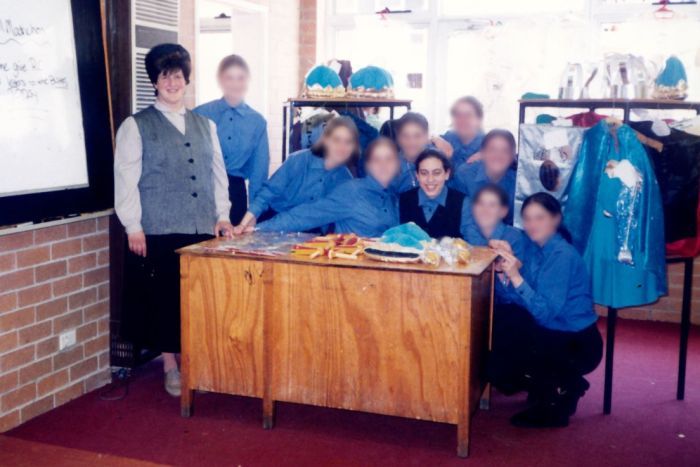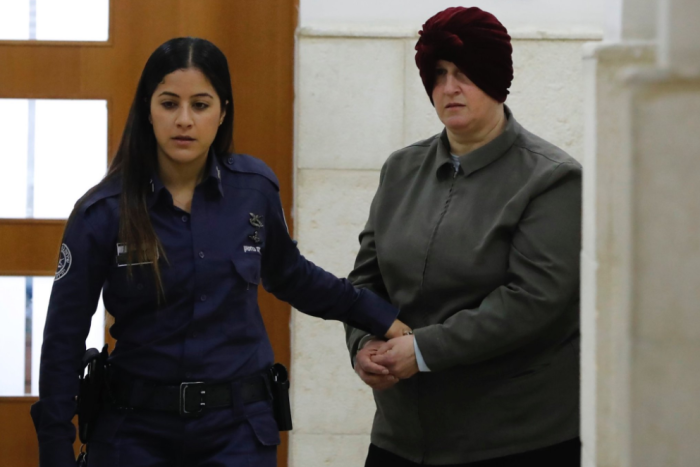Malka Leifer's lawyer secures two-week delay in extradition case
ABC
Norman Hermant and Fouad Abu Ghosh
2 May 2018
An Israeli judge has issued another extension of the extradition case of Malka Leifer, the Australian-Israeli accused of sexually abusing girls at a Jewish school in Melbourne more than a decade ago.
Ms Leifer will return to court on May 16, after her lawyer Yehuda Fried successfully argued the defence still had not seen all of the evidence against her.
The prosecution agreed to turn over all of the evidence from the investigation into whether Ms Leifer was lying about being too unwell psychologically to stand trial.
Australia has been seeking Ms Leifer's extradition since 2014.
For years, her extradition case stalled, as she was able to present evidence that her fragile mental health would be damaged by the stress of a trial.
In February, she was arrested after an undercover Israeli police investigation found she was fit to stand trial.
Ms Leifer is currently in custody in the high security Nave Tirtsa women's prison near Tel Aviv.
She was escorted into Jerusalem's District Court by two guards, with light chains around her ankles and wrists.
Near the end of proceedings, guards told the judge she was feeling unwell. She was removed from the court and taken to a secure holding area, at times almost collapsing and complaining she could not walk.
Leifer undergoing two simultaneous proceedings
Ms Leifer's case is complicated by the fact she is currently undergoing two proceedings simultaneously.
In District Court, the judge will determine if she is an "extraditable person" due to the nature of the charges in Australia.
In Magistrates Court, Ms Leifer could face criminal charges of obstruction of justice and lying to the court about her psychological condition.
Legal experts say even if Ms Leifer is indicted on the Israeli criminal charges, that does not necessarily mean the extradition hearing will be delayed.
The District Court judge could still decide, even though she is facing Israeli charges, she can be extradited regardless.
'Day of reckoning getting closer'
Israeli-Australian victim rights advocate Manny Waks, who was at Wednesday's hearing, said he is encouraged — despite another delay.
"Malka Leifer's day of reckoning is getting closer, and we welcome that," he said.
He also welcomed the judge's refusal of a defence request Ms Leifer be released into house arrest as the case continues.
"The victims have said they are breathing a sigh of relief now that she's in jail," Mr Waks said.
Even if there is a decision Ms Leifer can be extradited, that will be far from the end of the matter.
Ms Leifer will return to court on May 16, after her lawyer Yehuda Fried successfully argued the defence still had not seen all of the evidence against her.
The prosecution agreed to turn over all of the evidence from the investigation into whether Ms Leifer was lying about being too unwell psychologically to stand trial.
Australia has been seeking Ms Leifer's extradition since 2014.
For years, her extradition case stalled, as she was able to present evidence that her fragile mental health would be damaged by the stress of a trial.
In February, she was arrested after an undercover Israeli police investigation found she was fit to stand trial.
Ms Leifer is currently in custody in the high security Nave Tirtsa women's prison near Tel Aviv.
She was escorted into Jerusalem's District Court by two guards, with light chains around her ankles and wrists.
Near the end of proceedings, guards told the judge she was feeling unwell. She was removed from the court and taken to a secure holding area, at times almost collapsing and complaining she could not walk.
Leifer undergoing two simultaneous proceedings
Ms Leifer's case is complicated by the fact she is currently undergoing two proceedings simultaneously.
In District Court, the judge will determine if she is an "extraditable person" due to the nature of the charges in Australia.
In Magistrates Court, Ms Leifer could face criminal charges of obstruction of justice and lying to the court about her psychological condition.
Legal experts say even if Ms Leifer is indicted on the Israeli criminal charges, that does not necessarily mean the extradition hearing will be delayed.
The District Court judge could still decide, even though she is facing Israeli charges, she can be extradited regardless.
'Day of reckoning getting closer'
Israeli-Australian victim rights advocate Manny Waks, who was at Wednesday's hearing, said he is encouraged — despite another delay.
"Malka Leifer's day of reckoning is getting closer, and we welcome that," he said.
He also welcomed the judge's refusal of a defence request Ms Leifer be released into house arrest as the case continues.
"The victims have said they are breathing a sigh of relief now that she's in jail," Mr Waks said.
Even if there is a decision Ms Leifer can be extradited, that will be far from the end of the matter.
 PHOTO: Malka Leifer was the headmistress at Adass Israel Girls School in Melbourne. (Supplied)
PHOTO: Malka Leifer was the headmistress at Adass Israel Girls School in Melbourne. (Supplied)
Once an extradition ruling is made, she will have at least 30 days to appeal to Israel's Supreme Court.
And if the Supreme Court upholds the ruling, no extradition can take place until the order is signed by the Minister of Justice.
And then, the Minister's decision can also be appealed in administrative courts.
But experts were hard-pressed to name one case where a Minister's extradition order had been successfully challenged.
Legal experts believe end in sight
Still, many legal experts said they believe for this matter, which is now a very high-profile case in Israel, the end is in sight.
"I would say that it will take months, not many," former head of the International Association of Jewish Lawyers Irit Kohn said.
"I really think in this case, the judges, and the Minister of Justice will do their utmost to hasten it and do it in a shorter period of time."
She said many in Israel's legal community were aware the case has dragged on for almost four years.
"Just to make justice, it should be shorter," she said.
Originally published at ABC.
And if the Supreme Court upholds the ruling, no extradition can take place until the order is signed by the Minister of Justice.
And then, the Minister's decision can also be appealed in administrative courts.
But experts were hard-pressed to name one case where a Minister's extradition order had been successfully challenged.
Legal experts believe end in sight
Still, many legal experts said they believe for this matter, which is now a very high-profile case in Israel, the end is in sight.
"I would say that it will take months, not many," former head of the International Association of Jewish Lawyers Irit Kohn said.
"I really think in this case, the judges, and the Minister of Justice will do their utmost to hasten it and do it in a shorter period of time."
She said many in Israel's legal community were aware the case has dragged on for almost four years.
"Just to make justice, it should be shorter," she said.
Originally published at ABC.
